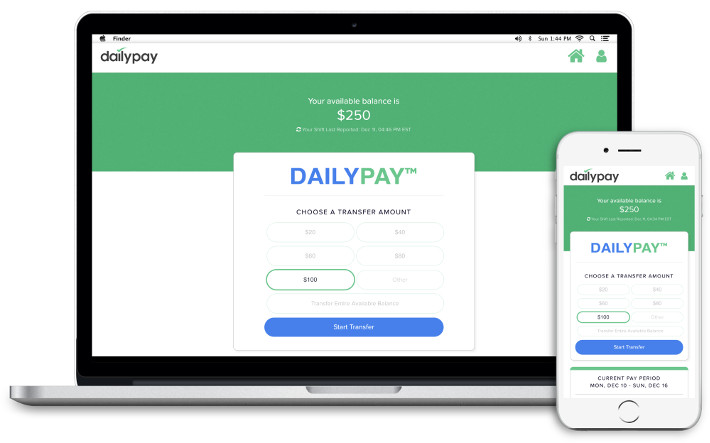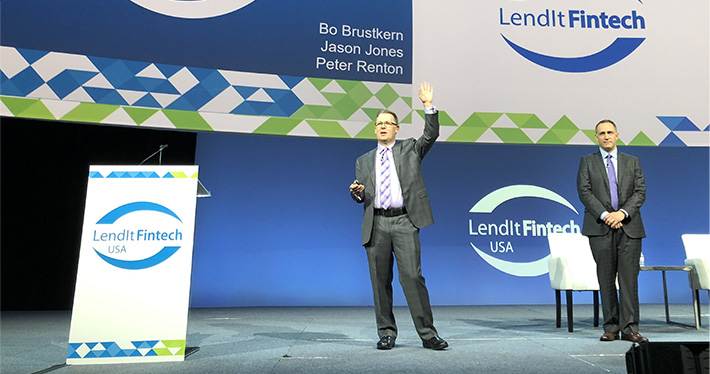Archive for 2020
Avant CEO: Colorado Decision Framework for Bank Fintech Partnerships
October 13, 2020 After three years of litigation, in August, the Colorado “true lender” case settled with an agreement between the fintech lenders, bank partners, and the state regulators. Along with lending restrictions above a 36% APR, the fintech lenders will have to maintain a state lending license and comply with other regulatory practices.
After three years of litigation, in August, the Colorado “true lender” case settled with an agreement between the fintech lenders, bank partners, and the state regulators. Along with lending restrictions above a 36% APR, the fintech lenders will have to maintain a state lending license and comply with other regulatory practices.
The decision has been called unfair regulation and a bad precedent for other similar regulatory disputes across the country.
But James Paris, the CEO of Avant, sees the decision as a victory for fintech lenders. Paris said the decision was an excellent framework for fintech/bank partnerships across the nation and a sign that regulators are finally taking the benefits of alternative finance seriously.
“For us, the case also involved being able to continue to provide these good credit products to deserving customers who maybe weren’t being served as well through some of the legacy providers,” Paris said.
Paris called back to the Madden vs. Midland Funding case in the US Court of Appeals Second Circuit decided in 2015. That case called into question if loans made in fintech bank partnerships in the state of New York were valid at the time of origination. Regulators charged that though national banks can create loans higher than state regulations allow, fintech partners buying those loans to take advantage of higher rates were skirting state regulations.
“The ruling was essentially that the loan would not continue to be valid,” Paris said. “Because the individual state in question, which was New York’s local usury law, would apply because it was no longer a national bank that held that loan after it had been sold.”
The decision called into question loans made in the fintech space. Paris said that the Colorado true lender Case was not about whether the banks were even making loans. Instead, fintech lenders were called the true originators and therefore didn’t have a license that allowed them to make loans at higher rates than the state allowed.
Paris said the decision showed confidence that fintech bank partnerships were not exporting rates, and that by limiting lending to under 36%, regulators were protecting bank fintech partnerships and consumers.
“All of the lending Avant does is under 36%, and that’s been the case for years,” Paris said. “In the space where we do play, from 9% to just under 35%, through our partnership with WebBank, we are confident in running a portfolio extremely focused on regulatory compliance.”
Colorado went from not allowing partnerships at all, to working with fintech companies to developing a set of terms that allowed partnerships to function, Paris said. He added that Avant’s products have always been to customers below nonprime credit, from 550 to 680 Fico scores, serviced by up to 36% APRs.
Paris said he does not know about customers outside of this range, or how they are affected by limiting APR to 36%, but he cited a study done by economist Dr. Michael Turner. Turner is the CEO and founder of the Policy and Economic Research Council (PERC), a non-profit research center.
The study compared lending after the Madden case in New York with how customers can be served after the Colorado true lender case. In the credit market Avant serves, Turner found that customers are better off with access to regulated fintech loans, as opposed to not having access at all.
The study looked at the average borrower credit score, APR, and loan size of Avant and WebBank borrowers, and found that if WebBank loans through Avant were prohibited, borrowers would be forced to access other means of credit, through much higher rates.
“Should WebBank loans be prohibited in Colorado, then we can reasonably expect that some non-trivial portion of the WebBank loan borrower population, as well as prospective future borrowers, will be forced to meet their credit needs with higher cost products,” Turner wrote. “This outcome is financially detrimental for this borrower population, most of whom have no access to more affordable mainstream alternatives.”
Given this data, Paris is happy to comply with the regulation. Without the framework Colorado has provided, Paris said borrowers would be worse off. Paris hopes that this decision will precede other state frameworks because what fintech bank partnerships need the most are consistent regulatory practices.
“I’m hopeful that to the extent there are ongoing concerns around bank models across other states, that this type of safe harbor model that Colorado helped develop is something that others could look to as a precedent or a model. Because I think the more that we can have consistency across the relevant jurisdictions, the better.”
DailyPay Allows Early Paychecks, Sees Adoption Rise in Pandemic Era
October 9, 2020 Americans are worried about paying their bills. DailyPay, a payment flexibility platform, gives businesses the ability to let workers access their paycheck early. For customers using the platform— no more waiting for payday.
Americans are worried about paying their bills. DailyPay, a payment flexibility platform, gives businesses the ability to let workers access their paycheck early. For customers using the platform— no more waiting for payday.
DailyPay has offered flexible payment since being founded in 2015. Recently, Fortune 500 companies have begun to slowly offer services like it. Last month, Square allowed a select few businesses to let employees cash out using their payment platform, but Vice President of Public Policy Matt Kopko said DailyPay stands apart, offering a payday loan-and-overdraft-killer for just $2-$3.
“We’ve created this industry that’s called the on-demand pay industry,” Kopko said, “which is essentially a technology that allows workers to get paid whenever they want without having to disrupt the employer’s payroll schedule.”
The system works as an employer-sponsored benefit; with business permission, the service collects time clock data, payroll data, and accounting data. DailyPay uses that data to estimate how much money a worker can collect after every shift, or in some cases, every hour worked Kopko said. If a worker is getting paid $2,000 a week, but after withholding gets a $1,300 direct deposit, DailyPay will be able to calculate it.
“So our technology essentially integrates all those systems, allows you to monitor your balance on a constant basis,” Kopko said. “To say: ‘Well, my work yesterday actually accumulated net of all my tax withholdings $123’ and then it’s essentially an ATM for your paycheck.”
Kopko said the product is geared toward the two out of three people in America that are only paid once or twice a month. If the first of the month comes around, but it’s a week to payday, that’s when an employee needs DailyPay- to pay rent when they have no other option.
With pandemic unemployment and state closures, the team at DailyPay has seen an increased interest in the platform. At the beginning of the shutdowns in March, DailyPay saw a 400% increase in users in just three days.
Without using a service like DailyPay, the way these consumers make payments is through overdraft on bank accounts or payday lending, Kopko said. Surveys of DailyPay customers show one in four overdraft two to four times a month. After using the service, that number went down from 25% to 5%. Kopko shared that after using DailyPay, the number of customers relying on overdraft went down 40%.
“We’ve estimated that [customer] financial savings are approximately $1,200 a year,” Kopko said. “It’s not just about a tool for convenience; it’s about putting hundreds of dollars back into people’s pockets, the most vulnerable among them.”
Overdrafts have long been used as evidence toward claims that traditional banking harbors abusive, predatory practices toward the lowest-income working families. In 2017, the CFPB found that nearly 80% of overdrafts originated from the lowest 8% of account holders. That year Americans paid $34 billion in overdraft fees, according to MarketWatch.
Kopko said the platform is not just good for consumers, but businesses as well. He said DailyPay stats show an average of 40% increase in employee retention.
“For employees, we’re seeing tons of financial benefits, and for the employers, we’re seeing financial benefits,” Kopko said. “And it’s all because essentially we created the ability to have new control over your pay.”
The FTC’s Power to “Wipe Out” is Under Siege
October 9, 2020 As the FTC contemplates how to “wipe out” entire industries, federal courts around the country have recently ruled that the regulator can’t accomplish such a goal under Section 13(b) of the FTC act. That’s the statute the FTC relied on to bring its most recent actions against merchant cash advance companies. It might not have bite.
As the FTC contemplates how to “wipe out” entire industries, federal courts around the country have recently ruled that the regulator can’t accomplish such a goal under Section 13(b) of the FTC act. That’s the statute the FTC relied on to bring its most recent actions against merchant cash advance companies. It might not have bite.
Under 13(b), the FTC is empowered to bring a lawsuit to obtain an injunction against unlawful activity that is currently occurring or is about to occur. It’s powerful, but very limited. However, for the last several decades, the FTC, with the help of federal courts, has interpreted the statute to mean that it can also force the defendants to “disgorge” with illegally obtained funds.
That’s how the FTC wiped out Scott Tucker and his payday lending empire. In a lawsuit the FTC brought against his companies under 13(b) in 2012, the Court entered a judgment of $1.3 billion against him.
Not so fast, modern legal analysis says. Tucker’s case is being brought before the Supreme Court of the United States to settle once and for all what 13(b) allows for and what it doesn’t.
The momentum does not weigh in the FTC’s favor.
On September 30, the Third Circuit ruled in FTC v AbbVie that the FTC is not entitled to seek disgorgement under 13(b). The Seventh Circuit arrived at a similar conclusion last year in FTC v Credit Bureau Center.
In an interview with NBC, FTC Commissioner Rohit Chopra said in August “We’ve started suing some [merchant cash advance companies] and I’m looking for a systemic solution that makes sure they can all be wiped out before they do more damage.”
As the FTC attempts to be more proactive in the area of small business finance, it will be important to monitor what the Supreme Court ultimately decides it can actually accomplish.
Important News for MCA Collection Actions in New York – Governor Cuomo Lifts New York Civil Litigation Tolling Deadlines After November 3, 2020
October 9, 2020 On March 7, 2020, Governor Andrew M. Cuomo issued Executive Order No. 202 Declaring a Disaster Emergency in the State of New York due to the COVID-19 pandemic. Executive Order 202 was followed by Executive Order No. 202.8 on March 20, 2020, which tolled (i.e., suspended) “any specific time limit for the commencement, filing, or service of any legal action, notice, motion, or other process or proceeding, as prescribed by the procedural laws of the state . . . until April 19, 2020.
On March 7, 2020, Governor Andrew M. Cuomo issued Executive Order No. 202 Declaring a Disaster Emergency in the State of New York due to the COVID-19 pandemic. Executive Order 202 was followed by Executive Order No. 202.8 on March 20, 2020, which tolled (i.e., suspended) “any specific time limit for the commencement, filing, or service of any legal action, notice, motion, or other process or proceeding, as prescribed by the procedural laws of the state . . . until April 19, 2020.
In lay terms, Governor Cuomo’s Order suspended any statute of limitations deadline for the filing of a lawsuit, and perhaps more important for debt collection activities in the Merchant Cash Advance industry, suspended the deadline for obtaining default judgments in the State of New York. In other words, even after New York State Courts reopened in May, New York Courts could not issue default judgments against defendants who failed to appear in response to a summons and complaint in any civil action, including collection actions, if the date of default for non-appearance occurred after March 20, 2020.
The Governor’s suspension of court deadlines continued well past the initial April 19, 2020 deadline, being extended by numerous executive orders throughout the summer and early fall. The most recent executive order, Executive Order No. 202.67 issued on October 5, 2020, extended the tolling deadline again until November 3, 2020.
But there is hope in sight. In addition to extending the suspension of court deadlines, Executive Order 202.67 states, “for any civil case, such suspension is only effective until November 3, 2020, and after such date any such time limit will no longer be tolled.”
The good news here for debt collection professionals is that deadlines in civil cases in New York State will begin to accrue again as of November 4, 2020. What this means is that any civil action properly served on a defendant that was suspended as of March 20, 2020, will begin to accrue again on November 4, 2020.
In summary, for the debt collection professionals in New York State, this means a return to business as usual on November 4, 2020.
Austin LLP is a law firm that supports the Merchant Cash Advance industry. As such this article is attorney advertisement. The opinions reflected in this article are those of the author and should not be construed as legal advice.
OnDeck / Enova Merger Overwhelmingly Approved by Shareholders
October 8, 2020The drama surrounding what OnDeck allegedly did or did not disclose to shareholders about the Enova merger presumably came to an end on Wednesday. 38 million voting shares approved the deal while less than half a million voted against it.
However, shareholders sent a message by voting against “the compensation that may be paid or become payable to the Company’s named executive officers that is based on or otherwise relates to the merger.”
OnDeck has said that the merger is expected to be completed in the fourth quarter of 2020.
Square, Stripe, Intuit, Shopify, Talked SMB Lending at LendIt Fintech 2020
October 8, 2020 The LendIt Fintech digital conference last week was a sign of the times. This year, millions of average businesses and consumers have had to go virtual: they had no choice. 2020 has been a year of struggle and survival, and a time of great fintech adoption.
The LendIt Fintech digital conference last week was a sign of the times. This year, millions of average businesses and consumers have had to go virtual: they had no choice. 2020 has been a year of struggle and survival, and a time of great fintech adoption.
Some firms have been more successful than others. Going full digital, LendIt introduced virtual networking at the conference- the first day alone saw 2,171 meetings. Zoom meetings and virtual greetings took the place of handshakes and elevator pitches that would regularly accompany the convention.
On day three, LendIt hosted a panel of SMB lending leaders from Stripe, Shopify, Square, and Quickbooks Capital. Bryan Lee, Senior Director of Financial Services for Salesforce, served as moderator and he focused the discussion on “How the leading fintech brands are adapting.”
THE PIVOT
Lee began the talk by asking Eddie Serrill, Business Lead from Stripe Capital, about how the industry has pivoted.
Serrill talked about how Stripe was powering online interactions and saw an influx of traditionally offline businesses switching over to their platforms. Stripe also saw an increased demand for online purchases and payment.
“We’ve been trying to find that right balance between supporting users that have been doing incredibly well,” Serrill said. “While trying to support our users who are seeing a bit of a setback.”
Stripe introduced a lending product in September of last year and now SMBs can borrow from Stripe and pay back by diverting a percentage of their sales, much like the other panelists’ companies offer.
Jessica Jiang, Head of Capital Markets at Square Capital, talked about how her firm adjusted. Square reacted to fill the niche of their underserved customers by introducing a main street lending fund, serving industries hard hit by the pandemic, Jiang said. Small buinesess that relied on in-person action like coffee shops and retail community businesses were given preferential lending options.
Product Lead at Shopify, Richard Shaw, said that this year his firm learned to be prepared for anything. Everything that Shopify was potentially going to do or planning on implementing in the coming years suddenly became a here-and-now necessity.
“We tore up our existing plans,” Shaw said. “It was like the commerce world of 2030 turned up in 2020. You need to do ten years of work, but you need to do it today.”
Shopify, the Canadian e-commerce giant has doubled in value this year. The firm launched Shopify Capital in the US and Canada in 2016 and has originated $1.2 billion in funding to small businesses since that time.
Luke Voiles, the VP of Intuits QuickBooks Capital, talked about how his team handled pandemic conservatively.
“Five years of digital shift has happened instantaneously due to COVID,” Voiles said. “Intuit is pretty recession-resistant in the sense that you have to do taxes, you have to do your accounting, and the shift to digital helps a lot.”
Business lending was different, Voiles said, as soon as his team saw COVID coming, they battened down the hatches, slowed lending, and pivoted to facilitating PPP.
PPP
Voiles said the craziest thing he has seen in his career was what Quickbooks did to deploy PPP aid.
Within about two weeks, almost 500 people from across Intuit came together to shift all the data they carried on customers to aid applications.
“We were uniquely positioned to help solve and deploy that capital,” Voiles said. “We have a payroll business where 1.4 billion business use us, we have a tax business where we have Schedule C tax filings, and we have a lending business. We were able to pivot and put the pieces together quickly.”
QuickBooks Capital deployed $1.2 billion to 31,000 business in a process that Voiles said was 90% automated. Now customers are awaiting other rounds of government aid.
Square’s Jiang said the initial shutdown weeks in March and April saw hundreds of Square team members working on PPP facilitation through the night and weekends. As the funds dried up those first two weeks, it was clear to Jiang the program was favoring larger firms and higher loan amounts, leaving out small businesses.
“That’s typical of investment bankers, but not very typical of tech,” Jiang said. “PPP is a perfect example of how small businesses are continuing to be underserved by banks.”
THE SHAKEOUT AND THE FUTURE
2020 has been a major shock to the lending marketplace. Voiles from Quickbooks said the amount of work it took to make it through the first wave was a significant shakeout.
“You’ve seen what’s happening with Kabbage and OnDeck and other transactions with people getting sold; there is a shakeout happening in the space,” Voiles said. “The bigger players will make it through and will continue to help small businesses get access to capital that they need.”
When asked about the future roadmap of QuickBooks Capital, Voiles said it wasn’t just about automating banking. Using Intuit’s resources to build an automated system is only half of the picture- the firm believes in an expert-driven platform. After the automated process, customers will be able to talk to an expert to review the data, and “check their work.” Voiles said Quickbooks wants to offer a service that is equivalent to the replacement of a CFO.
“These small businesses that have less than ten employees, they can’t afford to hire a pro,” Voiles said. “They need automated support to show them the dashboard and picture of what their business is.”
Pointing to Stripe’s online infrastructure, Serrill exemplified what successful lenders will offer next year: a platform that combines many needs of SMBs in one place.
“I think it’s really about linking all of this data, making it super intuitive and anticipating the need for their users, so they don’t need a team of business school grads to manage their finances,” Serrill said. “So they can get back to building the core of their business, not figuring out whether they have enough cash flow tomorrow.”
Jiang said the future of small business would be written in data, contactless payments, and digital banking. She sees consolidation in the Fintech space and has a positive outlook on bank-fintech partnerships.
The FDIC granted Square a conditional approval for the issuance of an Industrial Loan Company ILC in March this year. Jiang outlined plans on launching an online SMB lending and banking service next year called Square Financial Services if the conditional charter remains in place.
For Shopify’s future, Shaw was excited to look forward to the launching of Shopify balance- a cash flow management system, and Shopify installment payments. He reiterated that the success of Shopify’s lending division was due in part because making loans was not the entire business.
“Shopify Capital is one piece of a wider ecosystem,” Shaw said. “All these things together are more powerful than individual parts.”
LendingClub Formally Ends “Peer” Aspect of Its Business, Proceeding With Radius Bank Acquisition
October 7, 2020 LendingClub is finally ending the “peer-to-peer” aspect of its platform for good. Earlier today, the company announced that it would cease offering and selling Member Payment Dependent Notes effective December 31st.
LendingClub is finally ending the “peer-to-peer” aspect of its platform for good. Earlier today, the company announced that it would cease offering and selling Member Payment Dependent Notes effective December 31st.
“Ceasing the Retail Notes program will allow LendingClub to redeploy capital and improve platform efficiency, enabling the company to help even more members as LendingClub progresses towards closing the Merger and becoming a bank holding company,” the company said in an official statement. “All Retail Notes outstanding as of the date the Retail Note program is ceased will be unaffected by the cessation of the program. Accordingly, with respect to such outstanding Retail Notes, LendingClub will continue servicing the corresponding member loans and information regarding such Retail Notes will remain viewable in the applicable Retail Note investor accounts.”
 LendingClub rose to fame with its peer-to-peer model nearly a decade ago, but using retail investors to fund loans has been eroding over time. ‘Peers’ Are Almost Gone From Lending Club’s Funding Mix was the title of a February 2019 deBanked story that highlighted this trend, for example.
LendingClub rose to fame with its peer-to-peer model nearly a decade ago, but using retail investors to fund loans has been eroding over time. ‘Peers’ Are Almost Gone From Lending Club’s Funding Mix was the title of a February 2019 deBanked story that highlighted this trend, for example.
Meanwhile, the focus on Radius Bank is a reminder that the announcement made nearly 8 months ago is still a work-in-progress.
“In connection with and in furtherance of the Merger, LendingClub has been in regular contact with federal banking regulators and, on September 25, 2020, filed an FR Y-3 application with the Federal Reserve to become a bank holding company,” the company said. “LendingClub plans to offer a full suite of products as a bank. This includes a high-yield savings account that will be initially exclusively available to its existing retail investors and will offer a compelling interest rate, as well as other products that take advantage of the marketplace to allow its customers to both pay less when borrowing and earn more when saving.”
Radius Bank was the subject of a major deBanked Magazine story in 2017 titled Tech Banks: Will Fintech Dethrone Traditional Banking?
Kapitus CEO Speaks on Success of Rating Reaffirmation
October 6, 2020 When lending companies faced the tightest squeeze on capital since the great recession, many ran into trouble. Kapitus, having survived 08′, met 20′ with the same discipline that helped them navigate the pandemic.
When lending companies faced the tightest squeeze on capital since the great recession, many ran into trouble. Kapitus, having survived 08′, met 20′ with the same discipline that helped them navigate the pandemic.
“Our whole industry was put on a credit watch downgrade, and it’s very exciting that we were upgraded, reaffirmed to the original rating,” Kapitus CEO and founder Andy Reiser said. “Most of the companies, our peers defaulted and went into what’s called rapid amortization and did not make it through to keep their securitization.”
Reiser was happy to report that Kapitus received a rating affirmation from Kroll Bond Rating Agency (KBRA) on Friday. KBRA has removed the Kapitus securities from a Watch Downgrade.
Back in March, the businesses that Kapitus and their competitors funded across the country, faced state mandated shutdowns. Many customers were suddenly unable to make the loan, MCA, or equipment payments that they had been able to make for years.
For lenders that bundled and securitized the loans they made, the value of those loans was called into question.
On March 30, KBRA placed the ratings of 29 securitizations representing $2.1 billion from 10 SMB lending firms on a “Watch Downgrade” due to the economic downturn.
To overcome the warning, Kapitus reigned in and focused on helping their customers. Reiser cited the addition of Jeff Newman from Citigroup to manage the risk team as an example of how the firm has been focused on funding responsibly for years.
“We focused on strong business practices and keeping the portfolio strong, and it paid off,” Reiser said. “We never stopped, we were not lending at the same velocity that we did pre COVID, but we never had a day that we didn’t fund a new deal.”
Reiser said that during the pandemic’s height, the team took a lot of long nights working on new products. One was a “step renewal” that allowed clients to pay installments and build up to the full payment, to make sure they were not overwhelmed. Kapitus also offered extended periods for their healthcare loans, up to 36 months, Reiser said.
For companies like Kapitus, a questionable rating could lead to a rapid amortization event: a sudden call to liquefy the bonds and give back investor money. For some, an event like this will spell the end: most firms don’t keep hundreds of millions or even billions on hand to give back principals in a moment’s notice.
Reiser said out of the ten securities on credit watch, only one other was reaffirmed, due to a renegotiation of terms that bond investors had to agree on. Kapitus made no negation but was reaffirmed due to the success of their business practice, Reiser said.
The securitization was initially issued for $105 million in June 2018, and expanded to $160 million last December, in three classes with a senior class rating of “A.”
Reiser believes that the pandemic, like the ’08 recessions, will see some consolidation and strong companies prospering in a displaced environment.
“I think COVID will teach a lot of other players that were very aggressive in coming down to this market that it’s not so easy,” Reiser said. “I think some of the banks and the alternative lenders that were more eager to come into this market may not be so aggressive at least for a while.”





























